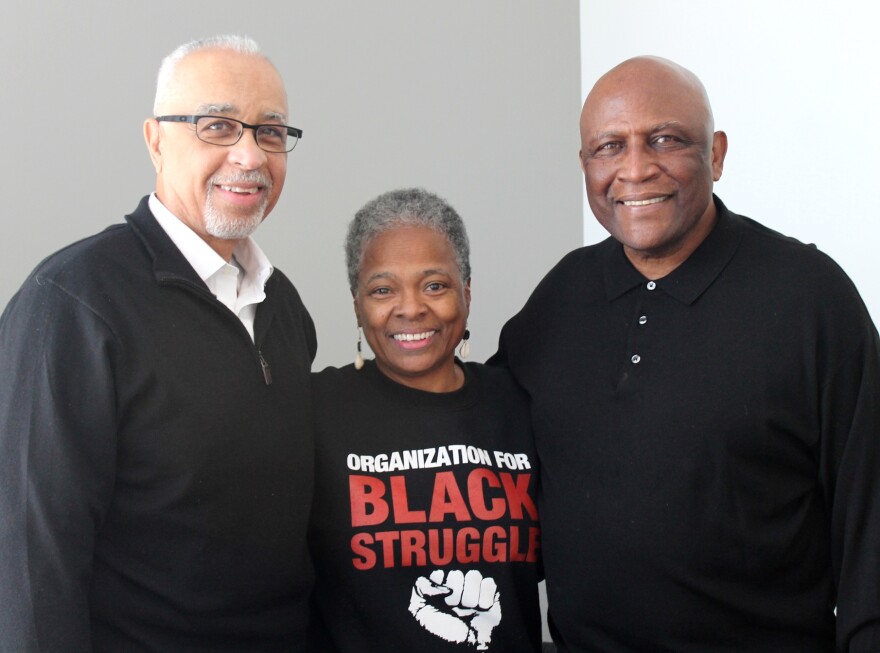Mike Jones remembers being “shocked but not surprised” when he heard that Rev. Martin Luther King Jr. had been murdered.
The assassination of the civil rights leader occurred a half-century ago this week in Memphis, Tennessee, when Jones was a 19-year-old freshman at the University of Missouri–St. Louis.
“The forces in America that have been against black progress have always taken black lives,” Jones said during a St. Louis on the Air conversation marking the 50-year anniversary of King’s death. “Black lives have always had less value in America. And men and women who actually fight for that kind of change usually do not live to be old men or old women, so no, you wouldn’t be surprised.”
Meanwhile, on the other side of Missouri, a then-17-year-old Jamala Rogers sprang into action at her segregated high school, where she was president of the student council. She tried to organize a school assembly, “something to focus that outrage and anger,” as she recalled during this week’s discussion with host Don Marsh. But the white principal was “fearful of gathering that many black students together,” Rogers said.
“And so we did not have that assembly, and there was a student walkout by all of the black students in the city of Kansas City,” Rogers added, “and eventually that led to an uprising where the National Guard was brought in.”
For Virvus Jones, who had returned to St. Louis after serving in the Vietnam War just weeks prior, the news of King’s death brought immediate tears.
“I was sitting in the cafeteria of the post office, eating my lunch, and the TV’s sitting there and I hear that, and I just started crying,” the former St. Louis comptroller said looking back on that day. “As Jamala said, it was a very solemn occasion. You could hear a pin drop in the cafeteria. Everybody was just stunned.”
The three guests discussed not only their memories of that day but the tumultuous year that surrounded it. They also shared their perspectives on the distinctions between change and progress, what they make of the current momentum among younger generations – and where they each stand on the spectrum between hope and despair.
“Fifty years later, Donald Trump is the president of the United States, and [we’ve seen] substantive change, because Barack Obama being president of the United States is like landing a man on the moon in 1969,” Mike Jones said, explaining why he remains hopeful but is at the same time not optimistic. “It’s a profound cultural and psychological moment.
“But fundamentally, we have never resolved the issue of race and privilege in America, and it’s fundamentally because there’s an internal conflict, the way I view it, in the white community about how they feel about race and privilege.”
For Rogers’ mother, King’s death seemed to trigger a sense of deep anguish.
“[She] was then a single mother, and she had five kids,” recalled Rogers, who is now the executive director of the Organization for Black Struggle. “And I think her reaction was one of despair and, you know, like the plight of black people was not going to go anywhere after this murder of this giant of a man.”
At one point in the St. Louis Public Radio conversation, Marsh brought a voicemail from a listener into the discussion. The resident of Quincy, Illinois, who was a child at the time of King’s assassination, recalled a white neighbor she’d previously looked up to gleefully cheering the news of his death.
“We’re still fighting the Civil War,” Virvus Jones said in response to the listener’s recollections and the question of how much progress has been made in more recent years. “When you saw those people marching in [Charlottesville] Virginia … These are young people who still feel the same way that that neighbor felt 50 years ago.”
Producer’s note: Host Don Marsh was a reporter in Baltimore when Rev. Martin Luther King Jr. was murdered, and in Marsh's book "Flash Frames: Journey of a Journeyman Journalist” he describes his experience covering the riots that occurred in that city following the assassination. Marsh also was on assignment in London when James Earl Ray was apprehended, and he contributed to coverage of that story. The book is available on Amazon and offers insight into a wide variety of national and world events over the past 50 years.
St. Louis on the Air brings you the stories of St. Louis and the people who live, work and create in our region. St. Louis on the Air host Don Marsh and producers Mary Edwards, Alex Heuer, Evie Hemphill and Lara Hamdan give you the information you need to make informed decisions and stay in touch with our diverse and vibrant St. Louis region.





